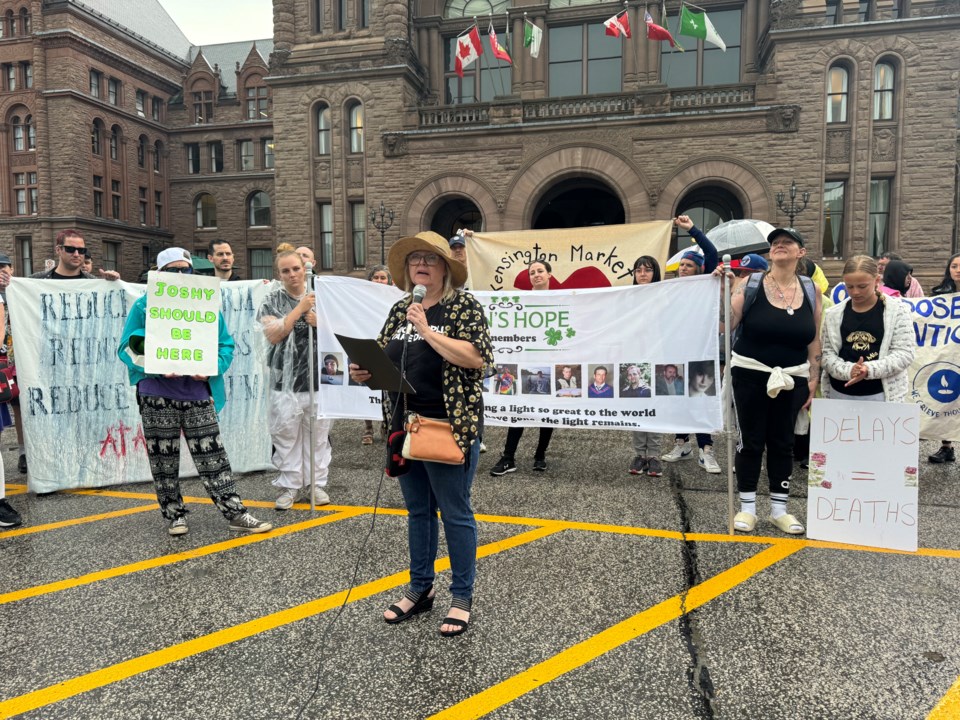EDITOR’S NOTE: This article originally appeared on The Trillium, a Village Media website devoted to covering provincial politics at Queen’s Park.
Standing in the rain in front of the Ontario legislature on Tuesday, Christine Nayler spoke into a microphone calling, again, for the people inside to fund supervised drug consumption sites.
"I was a registered early childhood educator teaching kindergarten, and now I do this," she said. "I stand before groups of people and lay my grief bare before them in hopes of opening hearts and changing minds so that no other mother has to know the irrepressible anguish of laying a child to rest."
Nayler was among a group of mothers from across Ontario who'd lost a child to toxic drugs and marched on Queen's Park with other advocates for supervised consumption sites, including the Registered Nurses' Association of Ontario (RNAO). Members of the New Democratic, Liberal and Green parties attended the rally, but were asked to listen and not to speak.
Health Minister Sylvia Jones is expected to announce new, stricter rules for Consumption, Treatment and Services (CTS) sites in the province, along with a review of the sites prompted by a July 2023 shooting that killed a woman near Toronto's South Riverdale Community Health Centre. All applications for CTSs — including those that had already been waiting years — were paused.
The province will "begin enacting enhanced accountability measures for existing consumption and treatment services sites to ensure that the safety and well-being of the public is protected," she and Solicitor General Michael Kerzner wrote in a letter to Toronto Public Health earlier this month.
On Tuesday, she told The Trillium the report is coming out "shortly," but not before the end of the week.
Nayler is from Barrie, which applied to the province for a funded CTS more than two years ago. It's one of at least five applications on hold. The province funds 17 sites and has said it will cap the number at 21.
"Our application has sat on someone's desk for over 30 months," said Nayler, whose son advocated for harm reduction measures before he died. "How many more people have to die? How many more families have to be forever altered?"
She accused the province of "needless stall tactics and delays."
"The tragedy of one isolated incident of gun violence cannot be used as an excuse to prevent people and communities across our province from access to accessing vital health services any longer," she said. "The Ontario government's decision to stop processing applications for more than a month while they conduct an investigation is irresponsible."
Other speakers came from other parts of Ontario waiting for funding for CTS sites, including Timmins, Sudbury and Windsor.
Kathy Moreland, an RNAO member whose son died from fentanyl poisoning, gathered a group of mothers holding photos of their dead children and shouted into the mic: "People in the legislature: these are people who have died, not numbers. They're people. They're my kids. They're her kids."
Moreland urged legislators to fund more sites, if not to save lives, to save money, because she said they lower hospital and emergency services costs.
"Supporting safe consumption services doesn't mean you condone illicit drug use," she said. "It means you understand that substance use is a health issue and not a criminal one affecting all walks of life in society. It means that you value all human life and its preservation."
Amber Fritz, the outreach coordinator at Réseau Access Network in Sudbury, said the people who used the site felt abandoned when it closed. It had opened with municipal funding and, when that ran out, survived on donations, including a grant from a local mining company, before it closed this spring.
She urged the province not to wait any longer.
"We need services now. People are dying now. Do the lives of people who use drugs not matter? F--- no," she said. "Of course they do."
Editor's note: This story was updated to correct the spelling of Christine Nayler's surname.
